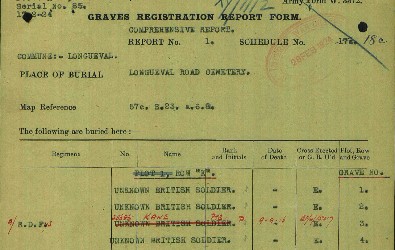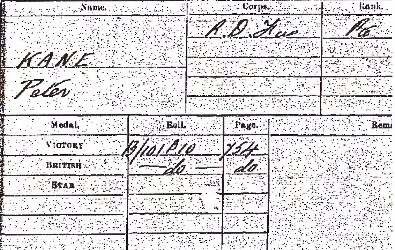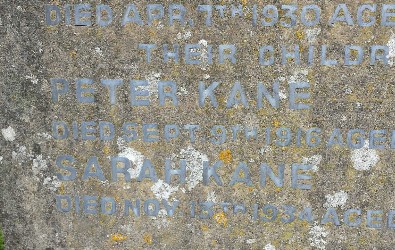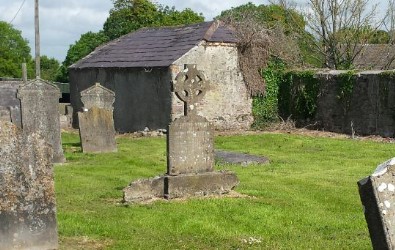The more we know about the past, the better prepared we are for the future.
-Theodore RooseveltIntroduction
My name is Stephen Reilly and I'm a secondary school history student from Naas CBS in County Kildare. I first became aware of the project when my history teacher, Crona Cassidy, notified us all of the trip. I was interested straight away as I had a great-great grandfather who served during the First World War. This is my great-great grandfather, Regimental Quartermaster Sergeant Thomas F. Lloyd who served in the British Army from 1890-1920.
-5vd2gs.jpg)
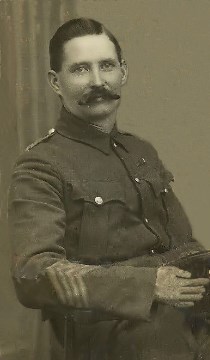
Representing Kildare
After submitting my essay application in the open competition, I was absolutely delighted to receive a letter notifying me that I had been selected as the Kildare representative in the Adopt A Soldier 2015 project. Both my history teacher and Principle, a former history teacher himself, were thrilled I had been selected. After about a month or so I received my soldier's name and brief details. From here on in, my free time would revolve around discovering the past life of Private Peter Kane.
Research
I began my research by tracing Peter's family in the national census. By looking through the Irish National Archives, I found the censuses of 1901 and 1911 were crucial in discovering the entire Kane family. The census provided me with Peter's religion; occupation; family and education. I then began to look at his military career where I stumbled upon the Dublin Fusiliers website which provided me with excellent information on his unit and their military service. It was from here that I discovered Peter had along with many others been killed in the Battle of Ginchy.
To get a better understanding of Peter's background before he joined the war, I began researching through "Findmypast.ie". It was this site which revealed that Peter had a petty criminal record, having discovered the case logs of the local courthouse at the time. The website also unveiled to me that Peter never married nor had children. Having hit a dead end on Irish websites, I turned to the British National Archives. Through their website I located Peter's Medal Index Card which told me of the medals he posthumously received from his service.
By this stage my online resources were drying up and I felt there was more to Peter's story than I had uncovered. I consulted with my history teacher who recommended I contact Mario Corrigan, Executive Librarian of the Kildare Collections and Research Services. I contacted him and he very kindly sent me newspaper cutting from the time of Peter's death. From cuttings of the "Kildare Observer", I identified that Peter had been presumed missing in action for a month before eventually being confirmed as killed in action.
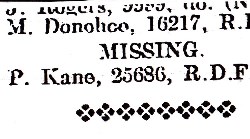
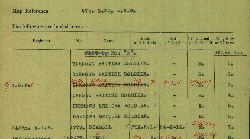
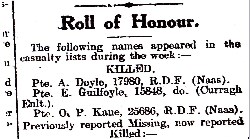
Through all this research I still found it difficult to track down a next of kin. With no children, Peter had no direct descendants. While his sisters could have most likely married, only the census of 1922 to be released in 2022 can confirm if Peter had any nieces or nephews. Still, I was able to rule out one sister out of three. By chance, I came upon a list of Kane's buried in Allen, County Kildare. I visited the old Allen Cemetery and discovered the Kane family plot still standing. On the headstone was Peter's: father, mother and sister Sarah, but most surprising was Peter's name. His family must have seen it necessary to have him commemorated on their own headstone.
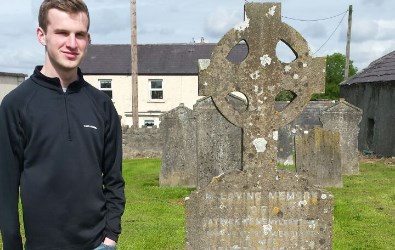
At the Kane family plot in Allen, Co. Kildare
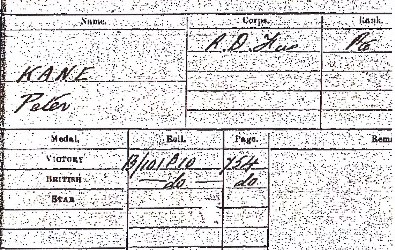
Peter's Medal Index Card from the British National Archives
Meeting at Collins' Barracks
On the 7th March, 2015, I had the pleasure of meeting with all the other students from all across the island of Ireland who had been successful in applying for this amazing trip. It was in Collins' Barracks in Dublin that the project organisers, sponsors and everyone else taking part in the trip met for the first time. We were briefed on our trip to Belgium and France while being surprised as we were told we would meet President Higgins before we left on June 26th.
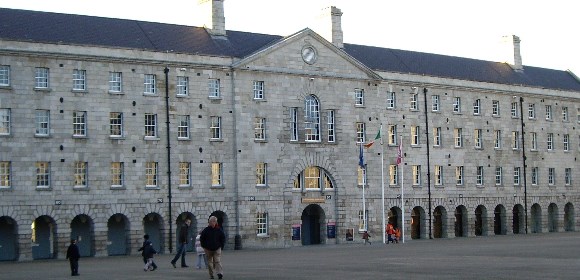
THE TRIP
On Friday June 26th, we all met in the Phoenix Park in Dublin. We the met with President Higgins at Aras an Uachtarain. After speeches made by both Gerry and President Higgins we had a quick cup of tea with our host before departing to Dublin airport to fly onto Brussels.
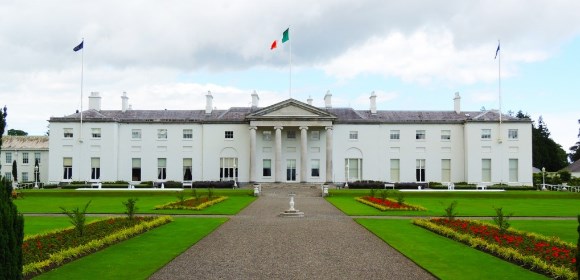
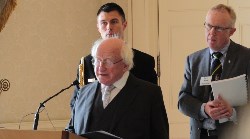
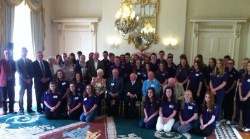

On Saturday, we begin our day by visiting the Lochnagar Crater. Gerry gave us a history on the crater before we moved onto visiting the cemeteries of our soldiers. Every cemetery was different in size and location but had several similarities. One would be that any cemetery with more 40 graves had a cross of sacrifice and another would be that each cemetery had a registry book that one could sign.
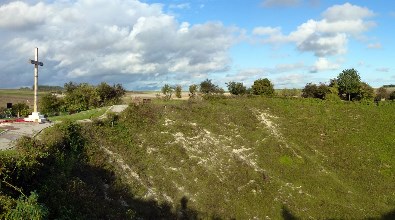
After visiting several allied cemeteries we had the experience of visiting a German cemetery. In my view, the differences can say a lot about how each of the countries experienced the allied victory. Compared to the white, vibrant headstones of the allied graves, the German cemetery seemed a dark place as the trees surrounding made it difficult for sunlight to shine on all of the graves.
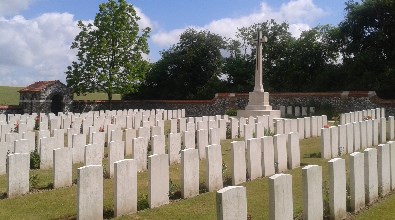
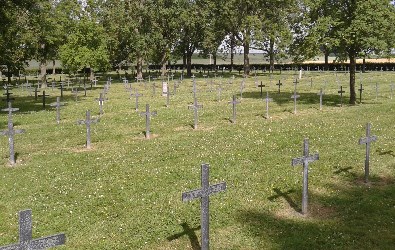
German Cemetery, Fricourt.
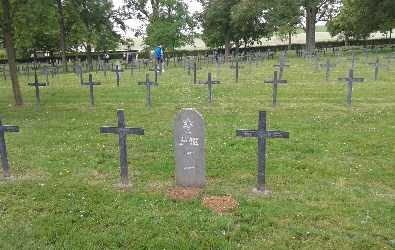
A German Jewish soldier's grave.
After the bus had stopped at a cemetery not too far from Longuveal cemetery, myself and a few others walked to my soldier's grave. We came upon Longuveal cemetery on the outskirts of a small town beside a road. It seemed small but dignified. I entered the cemetery and quickly found Peter Kane's final resting place. It was a strange feeling; from beginning with just a name a few months ago, to discovering his past life during any of your free time and then to have finally came to the end of your journey. I wasn't able to put a face to a name during my research but having seen his grave still standing for nearly a century, I was glad to realise that Peter Kane and so many others would not be forgotten.
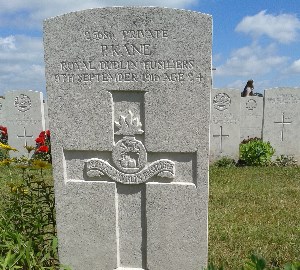
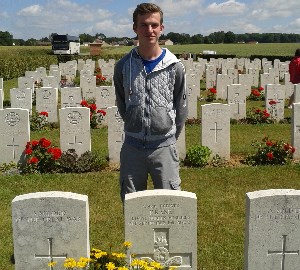
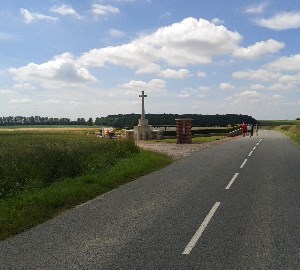
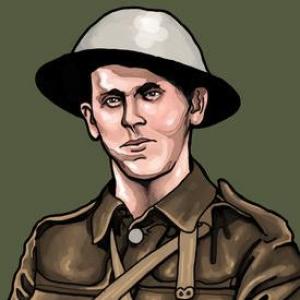
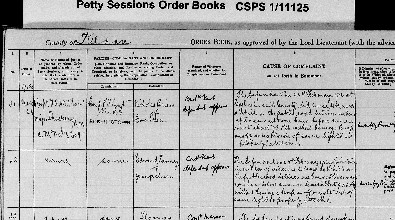
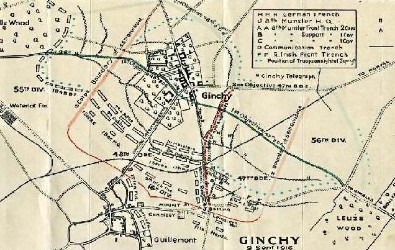
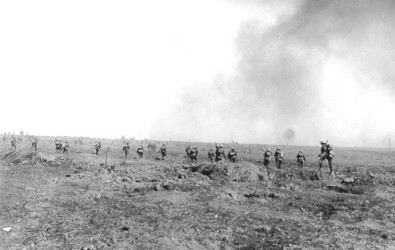
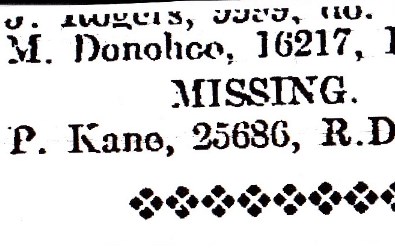
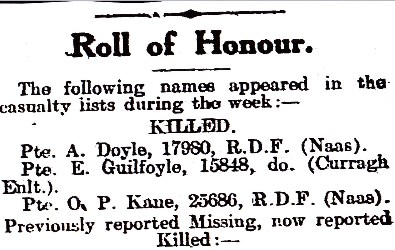
[1]-3kf4ns.jpg)
